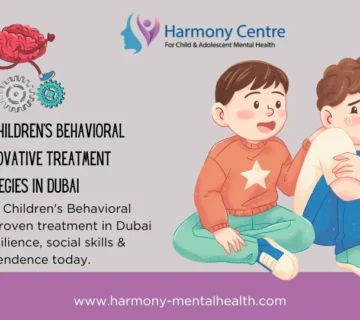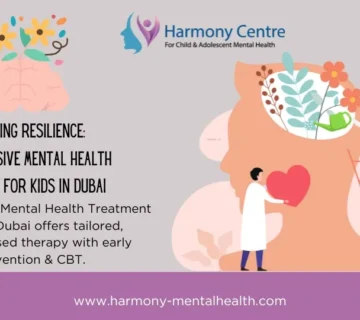Child Developmental Psychology in Dubai: Nurturing Growth for Lifelong Success
Explore child developmental psychology in Dubai. Learn how understanding developmental stages can support your child’s emotional and cognitive growth through expert insights and practical strategies.
1. Introduction: The Importance of Understanding Child Development
In the dynamic city of Dubai, where modern life and traditional values meet, understanding how children grow and develop is essential. Child developmental psychology offers insights into the cognitive, emotional, and social stages that shape a child’s life. By understanding these stages, parents can support their child’s mental well‑being and help them reach their full potential.
Early recognition of developmental milestones and challenges enables timely intervention. This proactive approach not only supports academic success but also nurtures emotional resilience and social skills. In Dubai, where educational pressures and multicultural influences are strong, applying developmental psychology principles can make a significant difference in a child’s overall growth.
Contact Information
| Contact Method | Details |
|---|---|
| Phone | +971 (52) 8773268 / 04 558 2015 |
| Click Here | |
| info@harmony-mentalhealth.com | |
| Address | Office 409, Building Alrazi-64C, 26th St, Healthcare City, Dubai |
2. Key Concepts in Child Developmental Psychology
Child developmental psychology studies how children change and grow over time. It focuses on various aspects of development including cognitive, emotional, and social growth. Several theories and models have shaped our understanding of these processes:
Cognitive Development
- Stages of Thinking:
Jean Piaget’s theory outlines how children progress through distinct stages of cognitive development—from the sensorimotor stage in infancy to the formal operational stage in adolescence. Each stage represents different ways of thinking and understanding the world. - Problem-Solving and Learning:
As children mature, their ability to reason, solve problems, and learn from experiences increases. This growth is fundamental to academic success and everyday decision-making.
Emotional and Social Development
- Emotional Regulation:
Learning to manage emotions is critical for forming healthy relationships. Erik Erikson’s stages of psychosocial development illustrate how children build trust, autonomy, and initiative as they grow. - Social Skills:
Social interactions, from playing with peers to engaging with adults, help children develop empathy, cooperation, and communication skills. These abilities are vital for navigating school and community life.
Developmental Milestones
- Physical Milestones:
From crawling to walking and fine motor skills like drawing or writing, physical milestones are indicators of overall development. - Language and Communication:
Language development not only reflects cognitive growth but also impacts social and emotional well‑being. Early language skills lay the foundation for effective communication and learning.
Understanding these key concepts helps parents appreciate the natural progression of their child’s growth and recognize when additional support might be necessary.
3. How Developmental Psychology Supports Child Mental Health
By applying the principles of developmental psychology, parents and caregivers can create environments that foster healthy growth. Here’s how this understanding translates into real-world support:
Tailored Parenting Strategies
- Age‑Appropriate Expectations:
When parents understand the typical developmental milestones, they can set realistic expectations. For instance, expecting a toddler to have advanced reasoning skills is unrealistic, but encouraging simple problem‑solving is beneficial. - Responsive Parenting:
Responsive parenting, which involves observing and responding to a child’s cues, is rooted in developmental psychology. This approach nurtures trust and helps children feel secure.
Early Identification and Intervention
- Recognizing Delays:
Early identification of developmental delays or challenges can lead to timely interventions. For example, if a child is not meeting language milestones, parents can seek speech therapy to support development. - Preventing Future Issues:
By addressing developmental challenges early, parents can help prevent more serious mental health issues later in life. Early interventions have been shown to improve long-term outcomes.
Enhancing Educational Support
- Individualized Learning Plans:
Understanding cognitive development allows educators to tailor learning experiences. When teaching methods align with a child’s developmental stage, children are more likely to succeed academically. - Social-Emotional Learning (SEL):
SEL programs that incorporate principles of developmental psychology help children manage emotions and develop positive social skills. These programs are increasingly integrated into Dubai’s schools.
Promoting Resilience and Self‑Esteem
- Building Coping Skills:
Teaching children strategies for managing setbacks and challenges builds resilience. When children understand that struggles are a natural part of development, they are more likely to persevere. - Fostering Independence:
As children grow, gradually increasing their independence boosts self‑confidence. Developmentally appropriate tasks, like managing small responsibilities, empower children to take charge of their own growth.
4. Practical Strategies for Supporting Child Development in Dubai
Dubai’s fast-paced and diverse environment offers unique opportunities to support child development. Here are some practical strategies for parents and caregivers:
A. Create a Structured, Stimulating Environment
- Consistent Routines:
Develop daily schedules that include time for learning, play, and rest. Visual schedules and charts can help younger children understand what to expect. - Enriching Activities:
Provide a variety of activities that stimulate cognitive, emotional, and physical development. This might include puzzles, interactive games, reading sessions, and outdoor play. - Safe Exploration:
Allow children to explore their surroundings safely. This nurtures curiosity and promotes problem-solving skills.
B. Engage in Responsive Communication
- Active Listening:
When your child speaks, listen attentively without interrupting. Reflect back what they say to show you understand. - Encourage Expression:
Use open-ended questions to encourage your child to share their feelings. Ask questions like, “How did that make you feel?” or “What do you think about this situation?” - Positive Reinforcement:
Celebrate successes and offer praise for efforts. Positive reinforcement builds self-esteem and encourages continued growth.
C. Foster Social and Emotional Learning
- Model Emotional Regulation:
Demonstrate healthy ways to manage stress and anger. When you model calm behavior, children learn to regulate their own emotions. - Teach Problem‑Solving:
Engage in role‑playing exercises that simulate common social challenges. This helps children practice conflict resolution and empathy. - Use Creative Therapies:
Encourage activities like drawing, music, and storytelling. These creative outlets help children express emotions and process experiences.
D. Collaborate with Educators and Professionals
- Work With Schools:
Stay engaged with your child’s school. Collaborate with teachers to understand your child’s academic and social needs and support school‑based SEL programs. - Access Professional Support:
If you notice developmental delays or behavioral issues, seek professional advice promptly. Early interventions such as counseling or therapy can make a significant difference. - Participate in Workshops:
Attend parenting workshops focused on child development. Learning effective strategies from experts can empower you to better support your child’s growth.
E. Emphasize Physical Health and Nutrition
- Promote Regular Exercise:
Physical activity is crucial for overall development. Encourage outdoor play or sports to improve physical fitness and reduce stress. - Ensure Balanced Nutrition:
A healthy diet supports cognitive function and emotional stability. Provide nutritious meals and educate your child about healthy food choices. - Prioritize Sleep:
Establish a consistent bedtime routine. Adequate sleep is essential for learning, memory, and emotional regulation.
Implementing these strategies consistently creates an environment where children can thrive. By combining these practical tips with professional support, parents can foster a nurturing atmosphere that promotes healthy emotional and cognitive development.
FAQs & Final Thoughts on Child Developmental Psychology in Dubai
Book a Consultation Now
6. Final Thoughts: Building a Brighter Future Through Informed Support
Understanding child developmental psychology is essential for nurturing well‑rounded, resilient children. In Dubai’s dynamic environment, where challenges are diverse and pressures are high, proactive and informed support can make a significant difference. By using the principles of developmental psychology, parents can set realistic expectations, provide appropriate guidance, and intervene early to ensure every child has the foundation for lifelong success.
At Harmony Centre, we integrate cutting‑edge research with practical strategies to support your child’s growth. Our comprehensive approach combines clinical expertise with family‑centered care, ensuring that your child receives the support they need to thrive emotionally, socially, and academically.
Investing in your child’s development today lays the groundwork for a brighter, more resilient future. Embrace the journey of growth by staying informed, engaging in proactive strategies, and accessing the wealth of resources available in Dubai. Together, we can build a nurturing environment that empowers every child to reach their full potential.
👉 Book a Consultation Now: Call +971 4 558 2015 or visit www.harmony-mentalhealth.com.
Join our online community and stay updated with our latest events, articles about Child Developmental Psychology in Dubai



